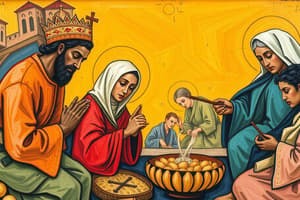Podcast
Questions and Answers
What term was commonly used by early anthropologists to describe non-European groups?
What term was commonly used by early anthropologists to describe non-European groups?
- Primitive cultures (correct)
- Indigenous societies
- Tribal systems
- Native communities
Which Igorot tribe is NOT mentioned in the content?
Which Igorot tribe is NOT mentioned in the content?
- Bontoc
- Ifugao
- Kalinga
- Moro (correct)
What is a primary purpose of the dances performed by the Igorot tribes?
What is a primary purpose of the dances performed by the Igorot tribes?
- For recreational activity
- To appease their gods (correct)
- To commemorate historical events
- To showcase athletic skill
Which of the following instruments is commonly associated with Moro dances?
Which of the following instruments is commonly associated with Moro dances?
What collective term is used for the non-Islamized natives of Mindanao?
What collective term is used for the non-Islamized natives of Mindanao?
From when do pictorial representations of dancers date back in Ancient Egypt?
From when do pictorial representations of dancers date back in Ancient Egypt?
How did early anthropologists view the cultures they labeled as 'primitive'?
How did early anthropologists view the cultures they labeled as 'primitive'?
What aspect of dance was significant in Ancient Egyptian culture?
What aspect of dance was significant in Ancient Egyptian culture?
What was one of the primary functions of dance in ancient Egyptian culture?
What was one of the primary functions of dance in ancient Egyptian culture?
Which of the following instruments was NOT typically associated with ancient Egyptian dance music?
Which of the following instruments was NOT typically associated with ancient Egyptian dance music?
What type of dance in ancient Greece was characterized by being ceremonial and slower?
What type of dance in ancient Greece was characterized by being ceremonial and slower?
In ancient Egyptian culture, what was the role of dancers' attire and accessories?
In ancient Egyptian culture, what was the role of dancers' attire and accessories?
Which group of people significantly influenced the dance traditions of ancient Greece?
Which group of people significantly influenced the dance traditions of ancient Greece?
What is a distinctive characteristic of the Dionysian or Bacchanalian dance?
What is a distinctive characteristic of the Dionysian or Bacchanalian dance?
What was a common source for the inspiration of Greek dance according to historical practices?
What was a common source for the inspiration of Greek dance according to historical practices?
Which statement about the performance context of ancient Egyptian dances is true?
Which statement about the performance context of ancient Egyptian dances is true?
How was dance viewed in ancient Greek culture?
How was dance viewed in ancient Greek culture?
What role did hand clapping and body slapping play in ancient Egyptian dance?
What role did hand clapping and body slapping play in ancient Egyptian dance?
Flashcards are hidden until you start studying
Study Notes
Primitive Cultures
- "Primitive cultures" was historically used to describe non-European groups, but is now viewed as biased.
- Contemporary terminology includes "bands" and "tribes" to avoid negative connotations.
Dance in Philippine Indigenous Cultures
- Igorot Tribes: Six ethnolinguistic groups in Luzon (Bontoc, Ifugao, Benguet, Apayo, Kalinga) that retain anito religions, using dance for harvest rituals, health, prayers for peace, and safety in warfare.
- Moro Communities: Diverse Muslim ethnic groups characterized by intricate hand and arm movements in dances, accompanied by traditional instruments like the agong and kulintang.
- Lumad People: Non-Islamized natives of Mindanao who worship anitos through dance practices.
Ancient Egyptian Dance
- Ancient Egyptians had a strong dance culture, depicted extensively in murals and tombs from as early as 3000 B.C.
- Dance was integral to religious rituals, social occasions, and funerary practices aimed at celebrating life and preparing for the afterlife.
- Performance styles included both individual and group dances, with rhythms created by various instruments and body percussion.
- Dancers often performed in varied costumes, from minimal attire to elaborate garments adorned with jewelry and makeup.
Greek and Bacchanalian Dance
- In ancient Greece, dance was considered essential to civilization alongside music and wine-making.
- Dance was integral to Greek mythology and education, promoting beauty and cultural tradition.
- Two major dance forms:
- Apollonian Dance: Characterized by slower, ceremonial movements accompanied by instruments like lyres and lutes.
- Dionysian/Bacchanalian Dance: Associated with the cult of Dionysus; known for its passionate and frenetic movements, emphasizing connection and emotional expression.
Overall Significance
- Dance served various functions across cultures, from spiritual and ritualistic relevance in primitive societies to being a vital part of social and ceremonial life in ancient Egypt and Greece.
- The evolution of dance reflects cultural values, social structures, and religious beliefs within each society.
Studying That Suits You
Use AI to generate personalized quizzes and flashcards to suit your learning preferences.




